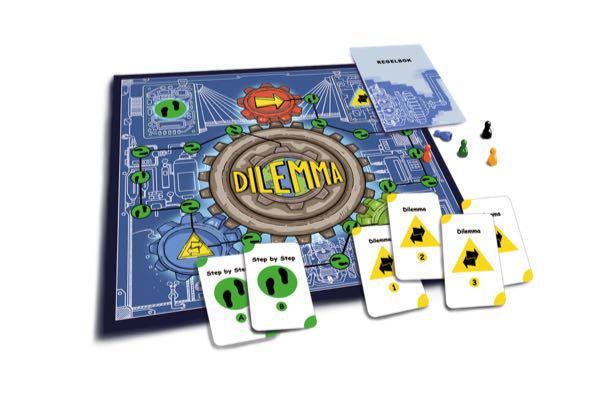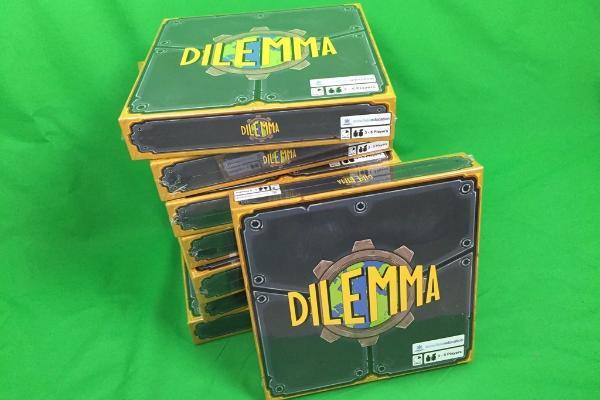Dilemma – a game for education


Dilemma is a quiz-like board game for 3-5 players, and a fun way to learn about sustainable development. The game also encourages participants to reflect, to debate and to think critically about sustainability dilemmas, which often have both moral and ethical dimensions.
The game is ideal for use in degree-level Engineering studies or in natural science oriented classes in high school. The box includes several sets of cards, aimed at different levels of knowledge and based on different topics, which could be covered in related lectures, briefings, or assignments.
Dilemma was developed to be used in classroom exercises or seminars, as a fun and interactive learning method for students. It is also a great tool for teachers, who can use the ‘dilemmas’ found in the box as a starting point for discussions, assignments or case studies.
- More Info
- Video
- Contact
Challenge Tackled
Learn more about Sustainability in a funny way and learn more about other people´s values and world views.
We have different values and worldviews and therefore different solutions to the social, ecological and economic problems we face. We need to learn to listen curiously and understand other people’s solutions and not just stick to our own.
Target group, beneficiaries or clients
Management groups and all co-workers. Students both at university and in university of applied science
Solution
The Dilemma board game is an interactive tool for introducing the concept of sustainable development. The game challenges people to go outside their comfort zone, to discuss and debate, think critically, as well as explain key concepts to one another.
Innovation
You can play Dilemma as a board game, but you can also play it on-line or in the field letting people be the game markers moving around in a field-board-game. Perfect during the pandemic.
Unique Selling Point
Progression in the Dilemma game is based on two different types of question cards: knowledge-based quiz questions and dilemma questions – both linking to sustainability. Knowledge-based questions can be used as a learning activity in their own right or as a knowledge-check in more advanced settings. The dilemma questions act as an incentive to initiate discussions in relevant areas.
Feasibility/Transferability
It is very easy to understand the board game. To play the game on-line is a bit more complicated.

 4 - Quality Education
4 - Quality Education
The COVID-19 outbreak has caused a global education crisis. Most education systems in the world have been severely affected by education disruptions and have faced unprecedented challenges. School closures brought on by the pandemic have had devastating consequences for children’s learning and well-being. It is estimated that 147 million children missed more than half of their in-class instruction over the past two years. This generation of children could lose a combined total of $17 trillion in lifetime earnings in present value. School closures have affected girls, children from disadvantaged backgrounds, those living in rural areas, children with disabilities and children from ethnic minorities more than their peers.
The proportion of young people completing upper secondary school increased from 54 per cent in 2015 to 58 per cent in 2020, with completion slowing down relative to progress in the preceding five-year period. It is too early to predict the effect of the COVID-19 pandemic on completion. Early indications from low-income countries based on phone surveys point to a small decline in attendance upon a return to school but a larger increase in repetition, which may increase dropout rates in coming years.
Data from 73 (mostly low- and middle-income) countries for the period of 2013-2021, indicate that about 7 in 10 children 3 and 4 years of age are developmentally on track, with no significant differences by child’s sex.
The participation rate in organized learning one year before the official primary entry age rose steadily in the years before the COVID-19 pandemic, from 69 per cent in 2010 to 75 per cent in 2020 but with considerable variation between countries (with the rate ranging from a figure as low as 13 per cent to nearly 100 per cent). This progress is being threatened by the COVID-19 pandemic, as schoolchildren in early childhood education and the early grades, especially from low- and middle-income countries, are the most affected by education disruption. In most countries, early education facilities and schools were partially or fully closed for more than a full school year.
Based on data for 2016-2018, the participation rate of youth and adults in formal and non-formal education and training in the previous 12 months among countries of sub-Saharan Africa with data is typically about 5 per cent or less compared with a rate of over 40 per cent in Northern American and many European countries.
